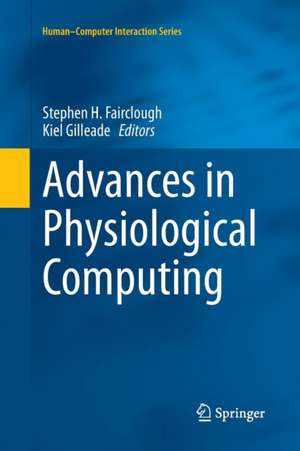Advances in Physiological Computing: Human–Computer Interaction Series
Editat de Stephen H. Fairclough, Kiel Gilleadeen Limba Engleză Paperback – 3 sep 2016
| Toate formatele și edițiile | Preț | Express |
|---|---|---|
| Paperback (1) | 330.42 lei 6-8 săpt. | |
| SPRINGER LONDON – 3 sep 2016 | 330.42 lei 6-8 săpt. | |
| Hardback (1) | 336.67 lei 6-8 săpt. | |
| SPRINGER LONDON – 8 apr 2014 | 336.67 lei 6-8 săpt. |
Din seria Human–Computer Interaction Series
- 20%
 Preț: 664.44 lei
Preț: 664.44 lei - 20%
 Preț: 375.54 lei
Preț: 375.54 lei - 20%
 Preț: 817.55 lei
Preț: 817.55 lei - 20%
 Preț: 822.51 lei
Preț: 822.51 lei - 20%
 Preț: 667.75 lei
Preț: 667.75 lei - 20%
 Preț: 938.66 lei
Preț: 938.66 lei - 20%
 Preț: 991.60 lei
Preț: 991.60 lei - 20%
 Preț: 655.85 lei
Preț: 655.85 lei - 20%
 Preț: 657.16 lei
Preț: 657.16 lei - 20%
 Preț: 645.31 lei
Preț: 645.31 lei - 20%
 Preț: 994.26 lei
Preț: 994.26 lei - 15%
 Preț: 658.05 lei
Preț: 658.05 lei - 20%
 Preț: 654.21 lei
Preț: 654.21 lei - 20%
 Preț: 644.48 lei
Preț: 644.48 lei - 20%
 Preț: 1621.89 lei
Preț: 1621.89 lei - 20%
 Preț: 309.25 lei
Preț: 309.25 lei - 20%
 Preț: 1175.42 lei
Preț: 1175.42 lei - 20%
 Preț: 659.97 lei
Preț: 659.97 lei - 20%
 Preț: 219.15 lei
Preț: 219.15 lei - 20%
 Preț: 334.86 lei
Preț: 334.86 lei - 20%
 Preț: 969.84 lei
Preț: 969.84 lei - 20%
 Preț: 642.19 lei
Preț: 642.19 lei - 20%
 Preț: 314.39 lei
Preț: 314.39 lei - 20%
 Preț: 661.14 lei
Preț: 661.14 lei - 20%
 Preț: 995.89 lei
Preț: 995.89 lei - 20%
 Preț: 752.58 lei
Preț: 752.58 lei - 20%
 Preț: 990.30 lei
Preț: 990.30 lei - 20%
 Preț: 990.12 lei
Preț: 990.12 lei - 20%
 Preț: 336.21 lei
Preț: 336.21 lei - 20%
 Preț: 334.71 lei
Preț: 334.71 lei - 20%
 Preț: 312.62 lei
Preț: 312.62 lei - 20%
 Preț: 994.92 lei
Preț: 994.92 lei - 20%
 Preț: 331.74 lei
Preț: 331.74 lei - 20%
 Preț: 646.80 lei
Preț: 646.80 lei - 20%
 Preț: 994.40 lei
Preț: 994.40 lei - 20%
 Preț: 334.86 lei
Preț: 334.86 lei - 20%
 Preț: 329.76 lei
Preț: 329.76 lei - 20%
 Preț: 332.24 lei
Preț: 332.24 lei - 20%
 Preț: 992.11 lei
Preț: 992.11 lei - 20%
 Preț: 650.40 lei
Preț: 650.40 lei - 20%
 Preț: 337.00 lei
Preț: 337.00 lei - 20%
 Preț: 332.39 lei
Preț: 332.39 lei - 20%
 Preț: 1279.86 lei
Preț: 1279.86 lei - 15%
 Preț: 636.12 lei
Preț: 636.12 lei - 20%
 Preț: 336.67 lei
Preț: 336.67 lei - 20%
 Preț: 1000.70 lei
Preț: 1000.70 lei - 20%
 Preț: 645.14 lei
Preț: 645.14 lei - 20%
 Preț: 646.80 lei
Preț: 646.80 lei - 20%
 Preț: 656.03 lei
Preț: 656.03 lei
Preț: 330.42 lei
Preț vechi: 413.03 lei
-20% Nou
Puncte Express: 496
Preț estimativ în valută:
63.23€ • 66.10$ • 53.43£
63.23€ • 66.10$ • 53.43£
Carte tipărită la comandă
Livrare economică 06-20 martie
Preluare comenzi: 021 569.72.76
Specificații
ISBN-13: 9781447169932
ISBN-10: 144716993X
Pagini: 253
Ilustrații: XV, 238 p. 33 illus.
Dimensiuni: 155 x 235 x 14 mm
Greutate: 0.36 kg
Ediția:Softcover reprint of the original 1st ed. 2014
Editura: SPRINGER LONDON
Colecția Springer
Seria Human–Computer Interaction Series
Locul publicării:London, United Kingdom
ISBN-10: 144716993X
Pagini: 253
Ilustrații: XV, 238 p. 33 illus.
Dimensiuni: 155 x 235 x 14 mm
Greutate: 0.36 kg
Ediția:Softcover reprint of the original 1st ed. 2014
Editura: SPRINGER LONDON
Colecția Springer
Seria Human–Computer Interaction Series
Locul publicării:London, United Kingdom
Cuprins
Introduction.- Meaningful Interaction with Physiological Computing.- Engineering Issues in Physiological Computing.- Eye Tracking and Eye-Based Human-Computer Interaction.- Towards BCI-based Implicit Control in HCI.- Bio cybernetic Adaptation as Biofeedback Training.- Using fNIRS to Measure Mental Workload in the Real World.- Psychophysiological Feedback for Adaptive HRI.- The Drive to Explore.- The Vitality Bracelet.- Capturing HDM for Assisted Memory Recall.
Textul de pe ultima copertă
In the domain of physiological computing, human physiology is directly monitored and used as input to a technological system. Signals from the brain and body can be used to infer a user’s intentions and psychological state which enables a physiological computing system to respond and adapt in an appropriate fashion. A computer game could modify its level of difficulty according to the player's motivation or a word processor could disable incoming e-mail notifications when the user is concentrating.
Physiological computing is an exciting area of research which provides a speculative vision of how we may interact with technology in the future. The field is inherently interdisciplinary and encapsulates a significant breadth of knowledge from neuroscience to engineering. Advances in Physiological Computing provides a broad overview across this emerging area of research and emphasizes the common ground between the different disciplines in the field.
Physiological computing is an exciting area of research which provides a speculative vision of how we may interact with technology in the future. The field is inherently interdisciplinary and encapsulates a significant breadth of knowledge from neuroscience to engineering. Advances in Physiological Computing provides a broad overview across this emerging area of research and emphasizes the common ground between the different disciplines in the field.
Caracteristici
Broad overview of an emerging research field offering a unique and multidisciplinary insight into the area Emphasises the common ground between a range of physiological computing applications Provides a unique perspective on how we may interact with technology in the future Includes supplementary material: sn.pub/extras















